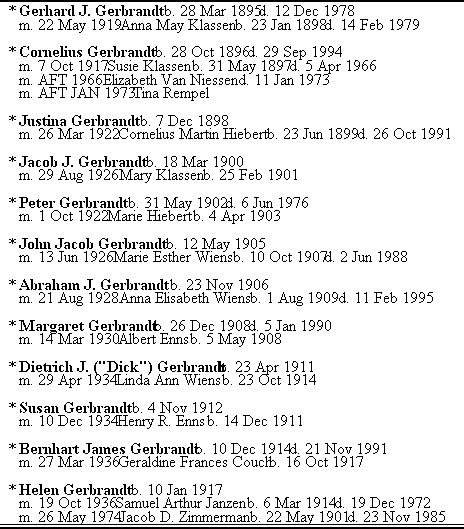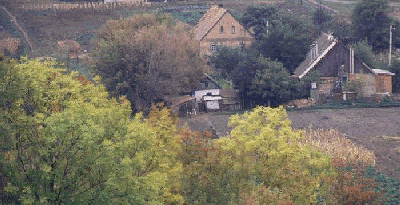~ About Gerbrandts ~ Our Gerbrandt ancestors probably originated in North Holland on the island of Texel, one of a chain of islands forming a barrier between the North Sea and the Netherlands. Johnny Gerbrandt (Book 1: The Gerbrandt Saga, by W. John Gerbrandt) conjectures that the name Gerbrandt could have derived from their line of work as primordial "peat farmers" who ran the giant kilns needed to dry the peat so that it could be sold as fuel for heating and cooking. Thus Gerbrandt, pronounced Ja' brant in Dutch, or Her'brandt in low German, becomes the past tense meaning burned or in effect he who burns.
As far back as we can trace, to about 1550, the Gerbrandts travelled with a group of Anabaptists (believers in conscious adult baptism), followers of Meno Simon (a contemporary of Martin Luther) now called Mennonites. In response to changing economic opportunities, a degree of success in farming that resulted in envious retaliation, and religious persecutions for their non-traditional beliefs in non-resistance and Protestant self-governance, the group moved on to various Dutch provinces, West Prussia, and Poland (They Seek A Country, David Wiebe, 1959). Known for their ingenuity and success as "land reclamation farmers" in Holland and Prussia (where they built the canals, dikes and pumps needed to drain the land for farming), they were invited by Catherine II to develop wheat farms in 1788 in the Ukraine of South Russia.
In 1789, 228 families settled on a grant of 32,000 acres of land on the banks of the Chortitza River (a tributary to the larger Dniepr River, not far from where it flows into the Black Sea). Between 1793 and 1796, another 118 families arrived from West Prussia, eventually forming more than eighteen new villages (Schonwiese, Kronsgarten, Burwalde, Niederchortitz, Kronstal, Neuosterwick, Schoneberg, Rosengart, Blumengart, Neuhorst, Chortitza, Rosental, Insel-Chortitza, Einlage, Kronsweide, Newenburg, Neuendorf, Schonhorst, and Heuboden) in the Chortitza and Molotschna colonies. Jacobs great great grandfather Diedrich (Diedrich, son Dirk b.1789, son Peter b.1814, son Dietrich, b.1838, son Grandpa Jacob) was probably part of the second group that migrated to the Chortitza colony (a guess based on a 1797 census from the Chortitza colony).
Grandma Justina Brandt (grandma to the children of the original 12 tribes) was born in 1875 in the newer Rosengart village. Grandpa Jacob's parents (Dietrich and Margaretha Gerbrandt) moved from Rosengart to the nearby village of Heuboden (now Borozenka). When Grandpa was 7 years old (1878), he and two other Gerbrandt children were "adopted" by the childless Rev. Gerhard Siemens and his wife, in order to help our great grandfather Dietrich (b.1838), who as a landless farmer was unable to support his large family. Grandpa and the Siemens moved first to the village of Steinau, colony of Nepluyevko, province of Ekaternoslav in 1885, and then in 1889 to the village of Vassilyevka, colony of Naumenko (Petrovka), where the Rev. Siemens was the leading minister to a population of about 700 Mennonites. It was there that Jacob married Justina in 1894.
Although the majority of the Chortitza group emigrated to America between 1874-1879 (mainly to Kansas where Mennonites were encouraged by land grants to develop farms adjacent to the new Santa Fe railroad line), about 8,000 of the 18,000 went to the Province of Manitoba in the Dominion of Canada instead. David Wiebe lists six reasons that Mennonites chose Canada: 1) Canada promised complete military exemptions. 2) They promised complete control of their own schools and churches. 3) They were given a free grant of land and a grant of $30/person for passage money. 4) They were promised that they could retain the German language in their schools. 5) They preferred living under a monarchial form of government. And 6) vast stretches of low-priced yet productive land were available. Grandma and Grandpa and their five children born in Russia (Gerhard [George], Cornelius, Justina, Jacob, and Peter) did not leave for Canada until 1903*. They moved with a group that included the grandparents of Grandma Justina (the Cornelius Brandt family). This was about the time that the government opened up a homesteading act on the great plains in South Central Saskatchewan, an opportunity that Grandpa took after working on John Klassen's farm for two years. In spite of the difficulties in farming a very rocky soil and harsh winters, Grandpa prospered as a farmer and had expanded his farm to 1,000 acres and his family to 12 (with the additions of John, Abe, Margaret, Dick, Sue, Ben and Helen) by 1917. Unfortunately, a "dust bowl" period followed. By 1919 Grandpa did not have enough money to keep up the payments on his farm equipment and had to declare bankruptcy. John Klassen (who Grandpa had first worked for in Manitoba) offered Grandpa a half section of his land in Rosenfeld Manitoba, allowing the family to stay until October of 1922.
Discouraged by the loss of his own land, Grandpa was encouraged by his son George (Gerhard) to join him in Reedley California, where George and many other Mennonite families had again found the vast kinds of opportunity that were so much a part of their fibre and search through history. Jacob, Justina, seven of their children (John, Abe, Margaret, Dick, Sue, Ben and Helen), and great Uncle Cornie (10 in all) headed off in a seven passenger 1918 Studebaker for Reedley, California. So, here we are. Five of the Gerbrandt "tribes" were left behind in Canada. Deep traces of seven are still here with us in California. Yet we know in our hearts, a new and gentler land is calling. The
12 Tribes of Jacob and Justina Gerbrandt
(*) Epilogue: Rev. Gerhard Siemens did not emigrate. Though he visited Jacob and Justina in Saskatchewan, he returned to Russia. Rev. Siemens and thousands of Mennonites in the Chortitza and Molotschna colonies were subsequently executed by the Bolsheviks.
These
all died in faith, Letters and Notes From the Family . From the Ben Gerbrandts: We are hoping that we can use this webpage as meeting place to share family announcements and a place where the "round robin" letter can also be put up for each of the 12 Gerbrandt "tribes." For this to happen, I am hoping that one of you from each of the tribes will serve as an internet/email representative for your tribe, something like what someone in each tribe is already doing to pass on the round robin letter. The
idea here is not to replace the round robin letter, but to offer a place
where it can seen immediately in parallel by anyone, as well as a place
where family announcement and notices can be posted. If you are interested
representing your tribe, please send me a note at . |
URL: http://www.gerbrandt.com/tribes.asp
Copyright ©1999 Lauren K. Gerbrandt. All rights reserved.
Revised--January 11, 2006


 .
.